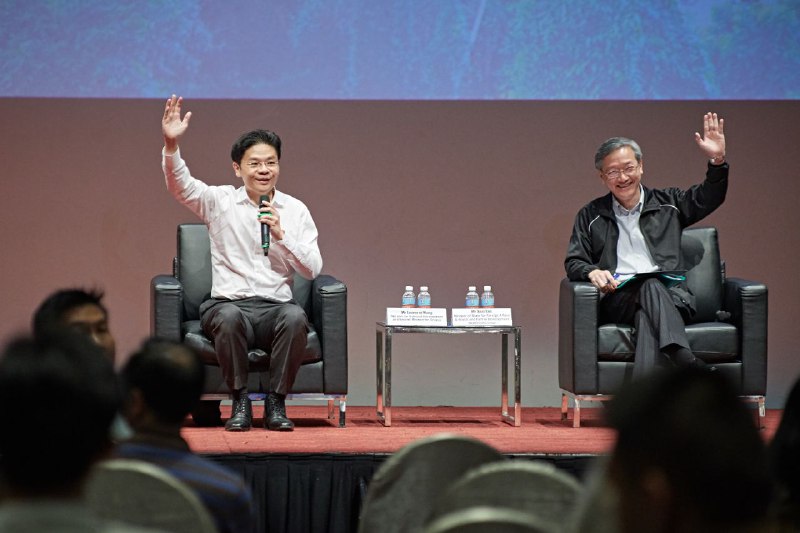Government to reach out to Singaporeans as it works out newly announced housing policies
Sign up now: Get ST's newsletters delivered to your inbox

Minister for National Development Lawrence Wong (left) and Minister of State Sam Tan at a public forum on Tuesday (Aug 21).
PHOTO: LIN ZHAOWEI FOR THE STRAITS TIMES
SINGAPORE - While details of the newly announced housing polices are being worked out, the Government will reach out to Singaporeans to gather feedback and understand their concerns to fine-tune the policies, said National Development Minister Lawrence Wong on Tuesday evening (Aug 21).
Speaking to the media on the sidelines of a public forum at shopping mall Bugis+, Mr Wong said the Government understands that Singaporeans are worried and unsure about what to expect, and have raised questions about the future of public housing, particularly as the building stock gets older and approaches the end of their leases.
A number of policies were announced early, said Mr Wong at the event organised by feedback unit Reach, to share the broad outline and roadmap of what people can expect about the future of housing.
In his National Day Rally speech on Sunday, Prime Minister Lee Hsien Loong announced a number of housing initiatives including the new Voluntary Early Redevelopment Scheme (Vers), which will allow more owners of Housing Board flats to sell their flats en bloc to the state before their 99-year leases expire.
On Monday, the Ministry of National Development (MND) also announced that it is expanding the lease buyback scheme to five-room and larger flats, while reviewing an easing of the rules for using Central Provident Fund (CPF) savings to buy older flats.
Announcing these policies before the details are finalised is to give Singaporeans assurance of the long-term plans for housing, said Mr Wong, who is also the Second Minister for Finance.
"There are a lot of implementation details to be worked out, so we are going to take this opportunity over the next few months or years to start engaging more groups of Singaporeans, understanding their concerns and getting feedback and ideas so that we can fine-tune and eventually work out the implementation details," he added.
Not just with the Vers scheme, he said, but also HDB's Home Improvement Programme (HIP) and HIP II, which will be launched when the first flats reach 60 to 70 years old about a decade from now, as well as the lease buyback scheme and the use of CPF funds for shorter-lease flats while safeguarding retirement adequacy.
"We are talking about a whole gamut of issues around the next phase of public housing which we want to engage Singaporeans on. Some will be done sooner, because they will be shorter term in nature, but some we will take more time to flesh out and work through implementation details," he said.
On Vers, which will eventually replace the existing Selective En bloc Redevelopment Scheme (Sers) for redevelopment purposes, Mr Wong said there are still sites that will undergo the Sers programme.
"But we will eventually reach the limit and clear all sites. Once we do that, we will transit to a Vers programme," he said, adding that the new scheme which allows residents in eligible precincts to vote to have the Government take back their flats, starting from around the 70-year mark of their lease, will be the proposal for redevelopment.
The move will allow the authorities to progressively redevelop old estates over a longer period, instead of only when their leases expire.
In order to bring these programmes to fruition, Mr Wong said they must be fiscally sustainable and the Ministry of Finance has to be able to secure the monies for them, adding that it will be a major fiscal commitment.
"What this depends on is more than just about availability of funds... It is all of us working together, securing a strong effective economy, good governance, and support for these long-term plans.
"If we have these prerequisites, then I think we will be able to ensure that the plans can translate into reality."


